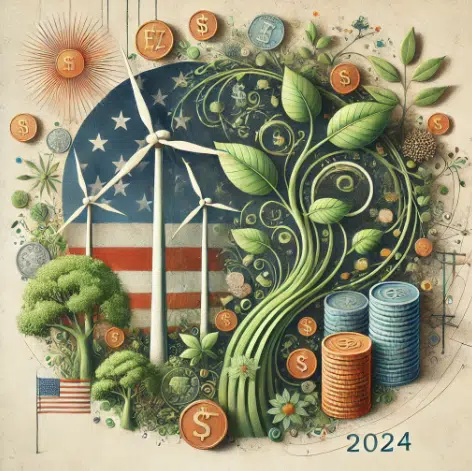In recent years, the concept of sustainable investment has gained significant momentum in the United States, with 2024 poised to further revolutionize this sector. As climate change awareness intensifies, more investors are looking to allocate their portfolios toward eco-friendly and socially responsible holdings.
This shift not only reflects a growing ethical commitment among financial stakeholders but also offers promising returns. As sustainability becomes more than just a buzzword, it’s important to explore the prominent trends and emerging strategies that are redefining the investment landscape in the USA.
Many believe that sustainable investment is the future of finance, as it aligns economic growth with environmental stewardship. This transition is driven by regulatory changes, evolving investor preferences, and technological advancements.
Investors are increasingly motivated by the dual objective of achieving competitive financial returns while contributing positively to society and the planet. So, what does 2024 have in store for eco-conscious investors in the USA? Let’s delve into the emerging trends shaping this transformative movement.
The rise of impact investing in 2024
Impact investing has surged as a paramount theme in the realm of responsible finance. Unlike traditional investments, this approach seeks to generate measurable social and environmental impact alongside strong financial returns.
As more investors demand transparency and accountability, impact-driven strategies are becoming central to portfolio diversification. This trend encourages businesses to adopt sustainable practices, ultimately fostering a more resilient economy.
The rise of impact investing is fueled by increased data availability and technological advancements that facilitate the measurement of outcomes. Investors can now assess the real-world effects of their investments with greater precision.
By prioritizing transparency, impact investments are likely to gain traction in 2024, attracting a wider audience, including high-net-worth individuals and institutional investors. Furthermore, financial institutions are recognizing the potential of impact investments in addressing global challenges.
Through collaboration with international organizations and government bodies, they aim to channel capital into projects that generate substantial societal benefits, such as renewable energy ventures and affordable housing initiatives. This convergence of interests underscores the potential for impact investing to drive profound change in the investment landscape.
Incorporating ESG factors into investment strategies
Another focal point in sustainable investment is the integration of Environmental, Social, and Governance (ESG) factors into financial analyses. As investors become more discerning, the demand for comprehensive ESG evaluations has intensified, influencing companies to enhance their sustainability disclosures. In 2024, we anticipate a further alignment of ESG criteria with risk management and financial metrics.
Institutional investors are leading the charge in embedding ESG elements into investment decisions. They recognize that incorporating these factors not only mitigates risks but also unlocks opportunities in emerging markets.
Companies excelling in ESG performance often demonstrate resilience in the face of regulatory shifts and reputational risks, further making them attractive investment prospects. Moreover, the rise of ESG integration has led to the creation of dedicated funds that cater to specific sustainability goals.
From clean energy ventures to socially responsible enterprise development, these funds provide investors with diverse avenues to contribute positively while reaping financial rewards. As ESG metrics become increasingly standardized, we can expect a surge in responsible investment products that resonate with the modern investor’s values.
Technological innovations in sustainable finance
Technological advancements have been pivotal in reshaping the sustainable investment landscape. From blockchain-enabled transparency to artificial intelligence-driven analytics, technology is revolutionizing how investors access, assess, and manage sustainable opportunities. These innovations empower investors to make well-informed decisions that align with their sustainability objectives.
Blockchain technology facilitates secure and traceable transactions, enabling a new level of trust between stakeholders. By ensuring the authenticity of sustainability claims, it mitigates the risk of greenwashing and promotes accountability. Similarly, AI tools enhance data processing capabilities, allowing investors to analyze large volumes of ESG data quickly and accurately.
Fintech solutions are democratizing access to sustainable investments by offering user-friendly platforms tailored to retail investors. These platforms provide insights, educational resources, and guided investment options, making sustainable finance more accessible to a broader audience. As technology continues to evolve, it will play an increasingly crucial role in advancing the sustainable investment agenda throughout 2024.
Regulatory advancements and policy changes
The regulatory environment significantly influences the trajectory of sustainable investment. Policymakers in the USA are increasingly focused on developing frameworks that encourage responsible finance and sustainable economic practices. In 2024, we anticipate new regulations that will further support the integration of sustainability considerations into investment portfolios.
The Securities and Exchange Commission (SEC) has already taken steps to enhance ESG disclosures, requiring companies to provide more detailed information about their sustainability initiatives. This shift aims to equip investors with the necessary tools to evaluate a company’s commitment to sustainable practices accurately. As this trend continues, enhanced transparency will likely become a standard requirement across various industries.
Moreover, government incentives promoting green investments, such as tax breaks for renewable energy projects and subsidies for sustainable developments, are expected to drive increased investor interest. These regulatory advancements signal a broader commitment to transitioning towards a more sustainable economy, offering investors opportunities to align their financial goals with societal objectives.





